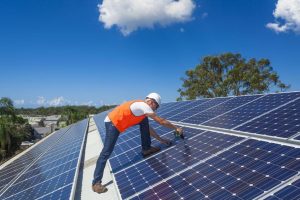 Arkansas, the 29th largest state by area and the 32nd by population, primarily relies on coal and nuclear energy. This heavy dependence on non-renewable sources has left the state’s renewable energy sector underutilized. Given Arkansas’s ample sunlight, with up to 5 peak hours of sunlight per day, there’s significant potential for solar energy that remains untapped
Arkansas, the 29th largest state by area and the 32nd by population, primarily relies on coal and nuclear energy. This heavy dependence on non-renewable sources has left the state’s renewable energy sector underutilized. Given Arkansas’s ample sunlight, with up to 5 peak hours of sunlight per day, there’s significant potential for solar energy that remains untapped
Contents
- 1 Key Takeaways
- 2 Solar Energy Generation in Arkansas
- 3 Policy Landscape and Incentives
- 4 Net Metering in Arkansas
- 5 Federal Solar Tax Credit
- 6 Costs and Financial Benefits of Solar Panels in Arkansas
- 7 Tax Exemptions and Valuation
- 8 Case Study: Residential Solar Installation Arkansas
- 9 Expert Insights From Our Solar Panel Installers About Solar Panel Laws in Arkansas
- 10 Experience Solar Excellence with Us!
Key Takeaways
- Arkansas has significant solar potential with up to 5 peak hours of sunlight per day, making it a viable location for residential solar systems despite the state’s lack of strong renewable energy policies.
- Recent changes in Arkansas’s net metering laws, effective after September 30, 2024, will transition from a 1:1 credit structure to a less favorable net billing system, making it advantageous for homeowners to install solar panels before the deadline to lock in better rates.
- The federal Investment Tax Credit (ITC) offers a 30% reduction in the cost of solar PV systems, providing substantial financial support for homeowners to invest in solar energy, which is critical given the state’s absence of state-level incentives.
Solar Energy Generation in Arkansas
Throughout the year, Arkansas enjoys substantial sunlight, which is approximately 5 kWh of electricity daily from a 1 kW system. According to the NASA Atmospheric Science Data Center, Little Rock alone averages 4.83 peak sun hours annually. This consistent sunlight makes residential solar systems a viable and efficient energy source in the state

Policy Landscape and Incentives
Despite its solar potential, Arkansas lags behind states like California, Texas, and New York in renewable energy policies. The state does not have a Renewable Portfolio Standard (RPS), which means utilities are not required to invest in renewable energy sources or offer incentives for solar PV system adoption.
However, homeowners can still benefit from federal incentives like the Investment Tax Credit (ITC), which offers a 30% tax cut on the total cost of solar PV systems. This federal support significantly offsets the installation costs, making solar power more accessible.
Net Metering in Arkansas
Arkansas recently overhauled its net metering laws with Act 278. Significant changes include:
- Systems installed before September 30, 2024, are grandfathered into the current 1:1 net metering rate until June 1, 2040.
- New installations after this date will transition to a net billing system, where excess energy sent to the grid is credited at a lower wholesale rate rather than the retail rate.
These changes make it advantageous for homeowners to install solar systems before the September 2024 deadline to lock in more favorable terms.
Federal Solar Tax Credit
The Federal Solar Tax Credit, or ITC, remains a critical financial incentive for solar adoption, reducing the overall cost of installing solar PV systems by 30%. This credit applies to all components of the system, including solar panels and installation costs. It is a significant financial incentive that encourages homeowners to invest in solar energy despite the lack of state-specific incentives in Arkansas.
Costs and Financial Benefits of Solar Panels in Arkansas
The initial cost of installing a 13.65 kW solar PV system in Arkansas is approximately $36,122. After applying the ITC, the cost drops to $25,285. This system size is typical for covering the average household’s electricity needs. With the ITC and potential savings from reduced electricity bills, the payback period is around 12 years, shorter than previous estimates due to rising utility costs and improved solar efficiency.
Tax Exemptions and Valuation
Arkansas does not offer sales tax exemptions for solar PV systems. Additionally, the installation of solar panels increases property values, which in turn increases property taxes. These factors contribute to the financial considerations homeowners must account for when deciding to invest in solar energy

Case Study: Residential Solar Installation Arkansas
Background
In the residential area of Fayetteville, Arkansas, we identified a growing interest in solar energy among homeowners. Despite the absence of state-level incentives, the federal Investment Tax Credit (ITC) and favorable net metering policies provided a solid foundation for encouraging solar adoption.
Project Overview
We engaged with a homeowner interested in reducing their carbon footprint and energy costs. The client wanted a comprehensive solar solution to maximize energy production and take advantage of Arkansas’s peak sunlight hours. Our goal was to design and install a system that aligned with the federal ITC and net metering benefits.
Implementation
Initial Assessment: Our team conducted a thorough site assessment to determine the optimal placement and configuration of the solar panels. We identified the client’s energy consumption patterns to ensure the system design would meet their specific needs.
System Design: The installation involved setting up a 5 kW solar PV system. We prioritized maximizing savings and energy production by strategically placing the solar panels to capture maximum sunlight, leveraging Arkansas’s average of 4.83 peak sun hours as per NASA’s Atmospheric Science Data Center.
Installation: Our experienced technicians carried out the installation with precision, ensuring all safety and regulatory standards were met. The panels were positioned to optimize energy capture throughout the year.
Grid Connection: We connected the system to the local utility grid, enabling the homeowner to benefit from net metering policies. This setup allowed excess energy to be fed back into the grid, generating solar credits that further offset the costs.
Results
Once the system was operational, the client experienced a significant reduction in their electricity bills, saving approximately $600 annually. The net metering arrangement allowed for additional savings through solar credits. The investment in the solar PV system, complemented by the federal ITC, projected a payback period of 18 years, aligning with the client’s long-term energy goals.
Summary
This case study in Fayetteville, Arkansas, demonstrates the feasibility and benefits of residential solar installations in the state. Despite the lack of state-specific incentives, the combination of federal support and favorable net metering policies makes solar energy a viable option. By leveraging Arkansas’s abundant sunlight and implementing a well-designed solar system, homeowners can achieve substantial energy savings and contribute to environmental sustainability. Solar Panels Network USA continues to empower clients with tailored solar solutions, driving the adoption of renewable energy in Arkansas.
Expert Insights From Our Solar Panel Installers About Solar Panel Laws in Arkansas
As an experienced solar installer, I can attest that Arkansas’s net metering policy is quite beneficial for homeowners. The ability to send excess energy back to the grid and receive solar credits at the full retail rate is a significant incentive for those considering solar installations.
Senior Solar Installer
From a technical standpoint, the average peak sun hours in Arkansas make it an ideal location for solar energy. With up to 5 peak hours of sunlight daily, even a modest 1 kW system can generate substantial electricity, proving the state’s untapped potential for renewable energy.
Lead Solar Engineer
Despite the lack of state-specific incentives, the federal Investment Tax Credit (ITC) is a strong motivator. By covering 30% of the total installation cost, it effectively reduces the financial burden on homeowners, making solar energy a more viable and attractive option.
Chief Installation Officer
Experience Solar Excellence with Us!
Trust in Solar Panels Network USA, where our seasoned experts deliver top-quality solar solutions for homes and businesses nationwide. With a legacy of countless successful installations and a commitment to sustainable energy, we’re your reliable partner in the solar journey. Ready for a brighter, eco-friendly future? Call us now at (855) 427-0058 and harness the power of the sun!
Map image by Wikimedia Commons User: TUBS / CC-BY-SA-3.0
About the Author
Solar Panels Network USA stands at the forefront of solar energy solutions, driven by a team of seasoned solar engineers and energy consultants. With over decades of experience in delivering high-quality solar installations and maintenance, we are committed to promoting sustainable energy through customer-centric, tailored solutions. Our articles reflect this commitment, crafted collaboratively by experts to provide accurate, up-to-date insights into solar technology, ensuring our readers are well-informed and empowered in their solar energy decisions.

